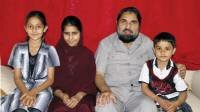It is morning at a medical ward in a state-run hospital with patients standing in a long queue for check-up.
Suddenly, a patient crying in pain emerges from one of the nearby wards. There is nobody to help him but a female nurse as doctors are away from the duty room. But she appears reluctant to attend the patient.
“How can I attend this poor man when a rascal is sitting beside his bed? He is more a harasser than an attendant,” she later tells me.
After thinking for a while, she enters the patient’s room and gives him the needed medicine. “It is my job to serve patients and I cannot shy away from my responsibility. We only feel bad when patients or their attendants stare at us and pass uncouth remarks,” says Nighat Bibi*, a nurse at Pakistan Institute of Medical Sciences (Pims).
Nurses perform numerous unpleasant jobs and even put their own lives at risk for the sake of patients but in return they are not given the respect and social prestige they deserve.
“Patients and their attendants routinely ask personal questions. They ask for cell numbers and sometimes even slyly take snaps when we are not looking,” she complains.
This is why being a nurse has become a social stigma in our society, says Nighat, before heading towards another patient. Elaborating on the risks involved in the profession, she says, nurses often contract diseases while treating patients.
“More than a dozen nurses in the hospital are suffering from Hepatitis B and C. Last year, two nurses contracted Congo Virus while treating patients and expired.”
Nurses contract infectious diseases because they do not always have access to necessary gear like gloves, masks and gowns. There is always shortage of special masks in public hospitals needed to treat patients like swine flu, leading to diseases to nursing staff.
Nighat laments this aspect of their lives is never highlighted in media and the society. They work round-the-clock to serve patients despite severe shortage of manpower but never complain about it.
Azka Noureen*, a nurse at Maroof International Hospital, says she often takes care of patients from well-to-do families and it is normal for her to be asked for her mobile number.
“I guess it is part of my profession to be offended by patients and sometimes by their attendants as well but my job is to take care of them and avoid getting into a squabble. One has got to learn to cope with the odds at the work place,” she says with a hint of resignation.
According to World Health Organization and Pakistan Nursing Council, there should be three nurses for ten patients. One senior nurse should also be deployed on rotation to ensure maximum care.
In ICU, CCU and emergency, there should be one nurse for one patient. Countries like Pakistan are nowhere near fulfilling these basic standards.
A safe estimate about nursing staff in our public hospitals suggests that it is around one nurse for more than 50 patients.
The workload can be gauged from the fact that, on average, a single nurse works for eight doctors whereas the international recommendations stipulate there should be 15 nurses for every doctor.
Nursing is perhaps, the only profession in Pakistan which offers a large number of jobs but the social stigma attached to the occupation keeps parents from allowing their daughters to pursue it as a career.
To curb harassment cases in hospitals and improve working environment, the government also enacted a harassment law in 2010 but it has done little to change the situation.
“A large number of nurses move to Saudi Arabia, United Arab Emirates and other Arab countries each year owing to the difficulties in Pakistan. It is unfortunate to see them go abroad for jobs but these countries offer lucrative packages and better working environment,” says Azka Noureen.
The average salary of nurses at public hospitals starts from Rs30,000. Interestingly, the average salary of nursing staff at private hospitals lies between Rs20,000 to Rs30,000 but they are provided with better facilities at the workplace besides provision of residence and transportation. Nurses get around Rs120,000 in Gulf countries and more than Rs150,000 in average monthly remuneration in the U.S., Canada and other European countries.
According to statistics collected from Overseas Employment Corporation (OEC), as many as 620 nurses flew abroad for jobs in the last five years.
Statistics about those who get jobs abroad through private firms and companies is not available but it is estimated to be almost the double of the OEC.
Contrary to the general perception that it is akin to a brain drain, OEC Managing Director Saeed Ahmed Sheikh says Pakistan offers jobs to only 25 percent of nurses and doctors annually. “If we don’t provide jobs to 75 percent of doctors and nurses, where should they go?”
He says Pakistan should be thankful to Arab and European countries for hiring skilled manpower in large numbers as compared to other countries.
“We should also pay tribute to Pakistani nurses working abroad as they not only send substantial remittances to the country but also work as peace ambassadors.”
However, he is candid enough to say the United States and European countries have almost stopped hiring skilled manpower, including nurses and doctors from Pakistan after September 11, 2001.
“The government should lean on these countries to hire nurses, doctors and engineers from Pakistan. It will help improve relations with these countries and earn Pakistan millions of dollars each year in remittances to help boost the ever-deteriorating economy.”
The managing director suggests the government to improve salary and service structure of nurses in public hospitals to improve the working capacity of the lot and meet shortage of manpower.
“We are only mandated to help interested candidates get good jobs in countries where the government has official contracts.”
Elaborating on the working environment in Middle Eastern and European countries, Sheikh says even a single case of harassment has not been reported with any institution of Pakistan till date.
“Majority of our nurses go Saudi Arabia and Oman. No-one can even dare think crossing the line there owing to strict implementation of rules and regulations.”
He says it is unfortunate that majority of interested candidates going abroad come from public hospitals.“Nurses working in the private sector are already getting lucrative packages besides the encouraging working environment. Therefore, they don’t need to go abroad for jobs.”
After prolonged protest demonstrations, the government has awarded Grade 16 to all nurses working in the public hospitals but the basic service structure is yet to be defined.
“We don’t get rights even after giving it our all. Nursing is the backbone of the medical profession but people here think we are just commodities to entertain them,” says a distressed Nighat.
“We don’t want to go on strike for our rights because then patients suffer. But ironically, the government functionaries don’t listen to our demands unless we shut the hospitals and take to the streets.”
However, Nighat doesn’t want to go abroad for a job. “I wish to serve my people and my country despite all the odds.”
The apathy of the government can be judged from the fact that whatever curriculum is designed by Pakistan Nursing Council, not a single book on it is available in the market. Students are left with no other option but to buy pirated books of Indian and British authors. “These books, too, don’t offer the material included in the syllabus.”
Commenting on how the generation be lured to the profession, Riffat Manzoor*, a nurse at Ali Medical Center, says that media and social activists should play their part in dispelling negative impression about the nursing occupation.
“If you’re a female doctor, you’ll get respect and status in the society but as a nurse you don’t.”
Dr Farzana Bari, a social activist and professor of gender studies at Quaid-i-Azam University, regrets how nursing is considered to be a low-status job in the society.
“A few sick-minded people also deem the profession socially unacceptable for the interaction of female nurses with male doctors and patients.”
She says most of the girls join the nursing profession owing to financial constraints in the family. “They fear losing the job if they report any harassment to their seniors. Therefore, the majority of cases go unreported, leaving them ever so vulnerable.”
Bari says there is a need to organize programmes and arrange seminars on humanitarian aspect of the nursing profession. “It will help improve and create soft image about the profession and youth can also be convinced to pursue it as a career.”
On improving the confidence of parents, she suggests the harassment law should be implemented strictly in the hospitals and proper mechanism should be devised to punish culprits.
“Parents will feel encouraged to allow their children to pursue nursing as a profession when they see strict implementation of the law in the hospitals.”
*Names have been changed to protect identity.
The writer is a journalist based in Islamabad.























